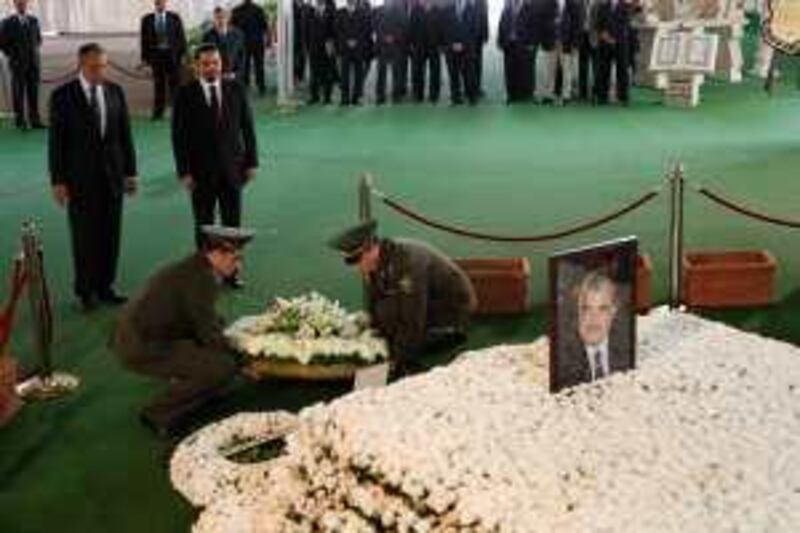BEIRUT // The startling news that the Special Tribunal for Lebanon could be considering indicting members of the Lebanese militant group Hizbollah for the 2005 assassination of Rafik Hariri threatened to become an election issue less than two weeks before what was already a bitterly contested vote.
With the parliamentary race closely contested between the pro-western government led by Saad Hariri, the son of the slain prime minister, and a coalition led by Hizbollah, the report in Der Spiegel, a German newsmagazine, threatens to push the rhetoric to dangerously volatile heights. The story, which had few sources, claimed that investigators with the tribunal found phone records linking about 20 Hizbollah officials to a smaller network of eight people thought to have conducted the car bombing on Feb 14 2005 that killed Mr Hariri and more than 20 others. The murder of the popular former prime minister infuriated much of Lebanon and led to a political uprising that forced Syria, which took much of the blame for the killing, to withdraw its troops from Lebanon.
The report contends that Hizbollah officials helped coordinate and support the cell in the planning and - based on what the magazine calls documented evidence - proves that Hizbollah officials were in contact with the killers at the time of the blast. Hizbollah immediately denounced the report as "outrageous". Its political enemies appeared stunned by the accusation and reacted with extreme caution, for fear of offending the heavily armed group, which in May of last year took to the streets in a spasm of violence directed at its Sunni political opponents.
Even the most outspoken critics of Syria and its allies in Hizbollah refused to make a direct accusation that the militant group was involved in the killing of a major Lebanese figure. "We cannot allow what the Der Spiegel magazine released on Saturday to become another Ain el-Remmaneh incident," the Druze chieftain Walid Jumblatt said. He referred to the killing of Palestinians on a bus driving through a Christian neighbourhood that sparked the Lebanese civil war in 1975. He went on to describe the charge as even more dangerous than that incident.
Saad Hariri, who has never shied from accusing Syria of killing his father, immediately refused to touch the explosive allegation. "We will not comment on any press leaks that do not directly come from the Special Tribunal for Lebanon, he said, adding, "We will only resort to decisions taken by the STL." But as Mr Hariri regularly addresses new developments in the case, often responding directly to rumours or speculation that implicate the Syrian regime in the killing, his tepid response left many in Lebanon wondering whether he believed these new allegations or if he was simply too afraid of Hizbollah's response to accuse them.
"It would be a declaration of war," said Amal Saad-Ghorayeb, an author and expert on Hizbollah. Determining the credibility of the story remains nearly impossible without more information as it cites internal documents used by the STL investigators. The documents described by the magazine explain that a special police unit led by Capt Wissam Eid uncovered a trail of phone numbers that first led to the eight men thought to be responsible for the assassination. That eventually led to another network of mobile phones alleged to have been used by Hizbollah's special forces military wing.
Capt Eid was killed in a car bombing on Jan 25 2008 in a Beirut suburb. According to the report, investigators also suspect Hizbollah's involvement in his killing. A Hizbollah military wing official responded to the report by arguing that this accusation had been expected by the group and said the leak is timed to affect the outcome of the June 7 election, which many observers think Hizbollah and its allies stand a good chance of winning.
"It was expected from the beginning that they would try and pin this killing on Hizbollah," said the official, who did not give his name but has supplied accurate information about the group in the past. Hizbollah is contesting 14 of the 128 seats in parliament, as it has traditionally done, but control of the government will hinge on the performance of its Christian allies in the Free Patrotic Movement, led by former general Michel Aoun.
But even among the tempered reactions by Hariri's allies and indignant denials by Hizbollah's followers, many Sunnis in Beirut greeted the news with fury. "Even if it's not true, we have to admit that Hizbollah's reputation lately had been bad, since their militia attacked us last year, and they declared it as a glorious day," Ahmad Hayak, 48, of Beirut said. A law student said that three years ago, he would have never believed such a rumour, but after Hizbollah's performance last May, he believes anything is possible. "Honestly I'm not surprised, because Hizbollah has been proving that they don't care about anyone or anything that does not relate to them," Mohammed Hajar said.
"They know they are the strongest with their guns. They just think about themselves as a strong militant power above all." mprothero@thenational.ae





